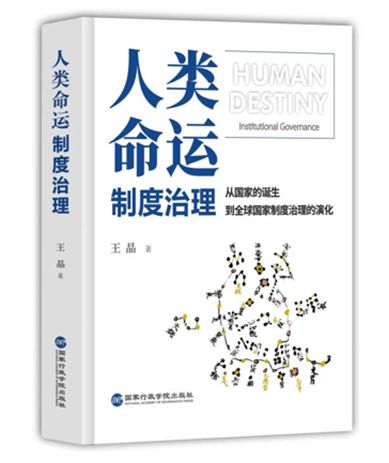
 0 Comment(s)
0 Comment(s) Print
Print E-mail China.org.cn, August 13, 2024
E-mail China.org.cn, August 13, 2024
A new book on institutional governance by national political advisor Wang Jing has been published on Aug. 13.

"Human Destiny: Institutional Governance" by Wang Jing. [Image courtesy of the National Academy of Governance Press]
Wang, a member of the 14th National Committee of the Chinese People's Political Consultative Conference (CPPCC) and CEO of Newland Group, delves into the deep-rooted causes behind the rise and fall of human societies, following on from her last book "Human Destiny: A Brief History of Governance."
The new book, "Human Destiny: Institutional Governance," focuses on the profound topic of human governance. It navigates thousands of years of human civilization, systematically exploring the origins and transformations of Eastern and Western systems. It examines the paths of various countries across different stages, highlighting the crucial link between the evolution of national institutional governance and the rise and fall of nations, while constructing a systematic logic from segmented, fragmented and superficial historical observations.
"Human Destiny: Institutional Governance" is divided into five chapters: The opening chapter, "The Dark Medieval Period," explores the origins and historical impacts of Western civilization, while "The Capitalist Era" analyzes the rise and fall of Western nations, focusing on systemic causes and America's rise to superpower status. Chapter three, "The Historical Shadows from Prosperity to Decline of the Nation," examines China's dynastic cycles and their declines due to institutional decay.
Chapter four "A Monumental Event: The Birth of an Advanced Political Party" discusses the transformative role of the Communist Party of China (CPC) in shaping the nation's development direction and future. The final chapter, "Governance Innovation in Chinese Modernization," then outlines the evolution of governance in China from traditional "technique-based governance" to "rule of law" to "joint governance by virtue and law." Wang argues that this allows for the creation of a new form of human civilization through Chinese modernization and ultimately stepping into a new era of governance in the digital age.
She pointed out that the country that takes the lead in governance reform and whose governance aligns with the direction of advanced productive forces will be the first to rise as a nation and lead human civilization toward the future.
She emphasized that the blueprint of digital civilization is unfolding, which will transform traditional governance shortcomings — such as fragmentation and localization. In the digital age, the relations of production will change with digital governance. Guided by digital governance thinking and supported by new paradigms, technologies, applications and methods that are both digital and intelligent, these new quality productive forces will propel society into the next era.
"Human Destiny: Institutional Governance" is published by the National Academy of Governance Press.
Go to Forum >>0 Comment(s)